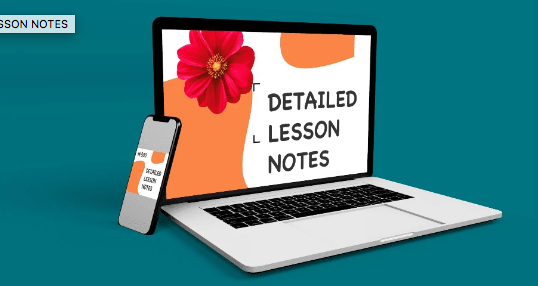First Term BST Lesson Note for Primary 6
ACCESS ALL LESSON NOTES
ACCESS ALL QUESTIONS AND ANSWERS
ACCESS ALL WORKSHEETS
ACCESS ALL JOBS ACCESS
ACCESS WAEC QUESTIONS AND ANSWERS
FIRST TERM PRIMARY SIX
WEEKS TOPICS/ CONTENTS
1. Units I Review of Primary Five’s Work
2. Units II Synthetic & Naturally Occurring Drugs
3. Unit III Drug use and abuse
4. Unit IV Our Weather
5. Unit V Earth and Sky Movement
6. Unit VI the Earth’s Movement
LIVING AND NON-LIVING THINGS
7. Unit VII Living and Non-living Things
– Identification of living and non-living things
– Characteristics of living and non-living things
8. Unit VIII Growing Crops
9. Unit IX Improving Crops Yield
10. Unit X the Human Circulatory System
– The Structure and Functions of the hearth
11. Unit XI Revision
12. Unit XII Examination
WEEK 2
TOPIC: SYNTHETIC AND NATURALLY-OCCURRING DRUGS
BEHAVIOURAL OBJECTIVES: AT THE END OF THE LESSON, PUPILS
SHOULD BE ABLE TO:
1 .State the meaning of drugs.
2. List the types of drugs
3. Mention the classification of drugs.
INSTRUCTIONAL MATERIALS:
A chart showing different kinds of drugs.
REFERENCE MATERIALS
Scheme of work
All relevant materials
9-Years Basic Education Curriculum
Online information
WEEK 2
BUILDING BACKGROUND/CONNECTION TO PRIOR KNOWLEDGE:
Pupils are familiar with the topic in their previous classes.
CONTENT OF THE LESSON
Meaning of Drugs
Good health is very important because without it/ we shall not be able to do anything. A sick person cannot go to school/ work or farm.
Since human beings are generally exposed to things that may make them sick/ such as environmental pollution/ malnutrition and germs/ it is therefore necessary to take drugs or substances that will fight against the causes of the sickness in the body.
A drug is a substance that affects the action of the body.’ Drugs can be used as medicine (i.e. to treat or prevent diseases) or as a stimulant (i.e. to make the body more active). Some of our food crops which are used for food are also drugs to our body. It is therefore nece ssary to take them moderately. If these food drugs are taken in large amounts they may become harmful to our body.TOPIC: SYNTHETIC AND NATURALLY-OCCURRING DRUGS
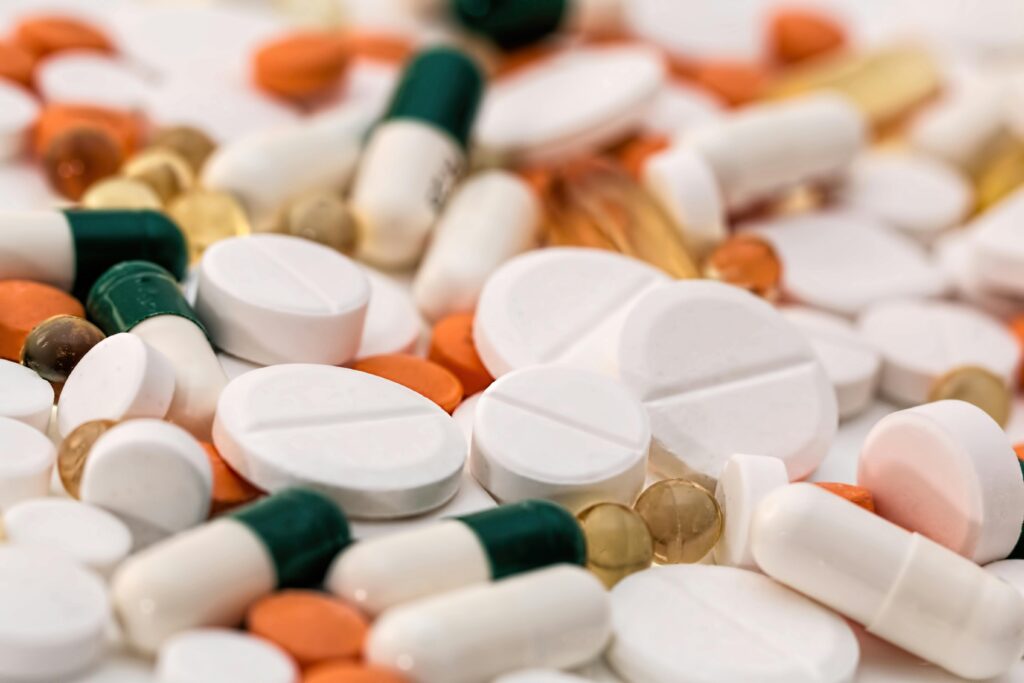
Types of Drugs
There are mainly two types of drugs. They are:
(i) Naturally occurring Drugs
They are called natural products.
These are substances from nature, e.g. vegetables, kola nut, coffee, tea, tobacco, fruits (such as lemon, lime), garlic, salt, pure honey.
(i) Naturally occurring Drugs
They are called natural products.
These are substances from nature, e.g. vegetables, kola nut, coffee, tea, tobacco, fruits (such as lemon, lime), garlic, salt, pure honey.
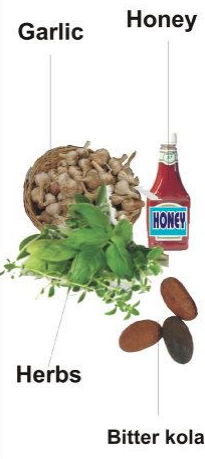
(ii) Synthetic Drugs
.These are chemical substances produced by human beings to treat or prevent diseases. A person who is trained to prepare and dispense drugs and medicine is celled a Pharmacist. Examples of synthetic drugs are; paracetamol, chloroquine/ aspirin.
Drugs that are in solid form are called tablets. Drugs in liquid form are called syrup.
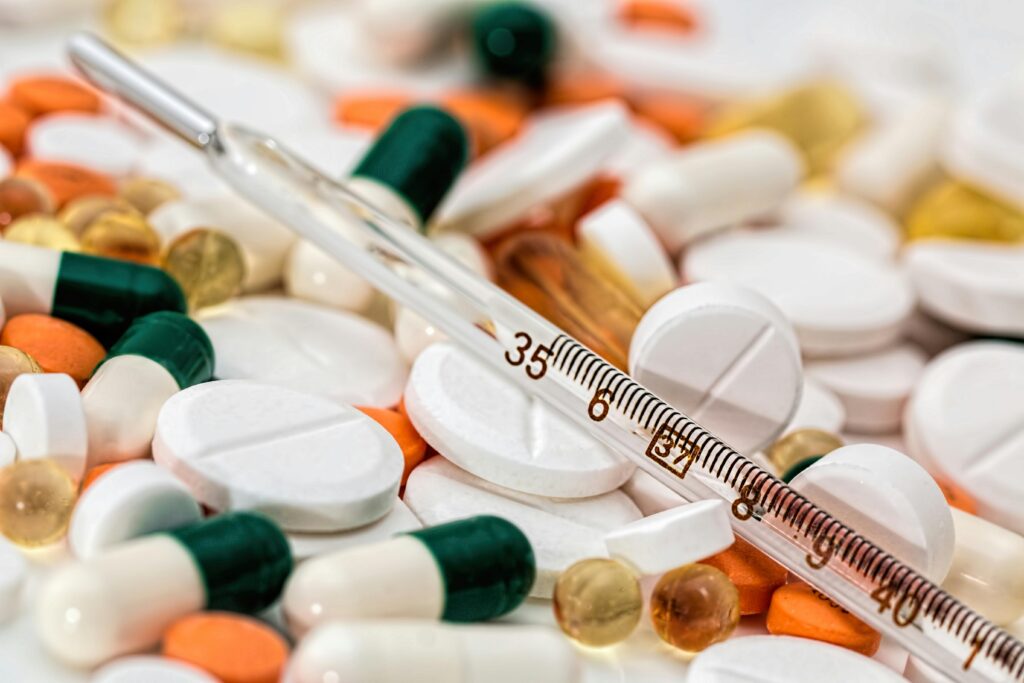
The two main types of drugs can still be classified into:
– Normal drugs
– Hard drugs
Normal drugs are the common drugs that doctors and nutritionists prescribed
to treat or prevent illness. Examples are paracetamol, aspirin and
chloroquine.
Hard drugs are drugs that are not really for medical purposes. They have
stimulant effects on the body i.e. they-affect mood or behavior. Examples
include cocaine/ heroine/marijuana and cannabis
Assessment & Evaluation:
1 .State the meaning of drugs.
2. List the types of drugs
3. Mention the classification of drugs.
(WRAP-UP CONCLUSION)
Teacher goes over the topic once again to enhance better understanding.
Answer these questions
1. What is a drug?
2. Explain the difference between naturally-occurring drugs and synthetic
drugs.
3. Give four examples of naturally-occurring drugs in Nigeria.
4. I can buy any drugs I like directly from a chemist’s shop – true or false?
5. Is food a drug? Give reasons for your answer.
WEEK 3
TOPIC: DRUG USE BEHAVIOURAL OBJECTIVES: AT THE END OF THE LESSON, PUPILS
SHOULD BE ABLE TO:
1 .State the meaning of drugs use.
2. List the effect excessive usage of drugs
3. Define drug abuse.
4, mention the effects of drug abuse,
INSTRUCTIONAL MATERIALS:
A chart showing different kinds of drugs.
REFERENCE MATERIALS
Scheme of work
All relevant materials
9-Years Basic Education Curriculum
Online information
BUILDING BACKGROUND/CONNECTION TO PRIOR KNOWLEDGE:
Pupils are familiar with the topic in their previous classes.
CONTENT OF THE LESSON
Effects of Normal Dosage of Drugs
A dosage is the prescribed amount of medicine one can take at a time. Normal
uses of drugs have their effects on our body.
These are:
(i) It makes us healthy.
(ii) It aids proper working of the body system.
(iii) It sustains our strength.
(iv) It relieves the sick person of their ailment.
Effect of Excessive Dosage of Drugs
Excessive dosage of drugs is taking drugs more than the body needs. This always have bad effects on the body. Excessive use of drugs is thus a form of drug abuse.
The effects of excessive use of drugs are:
(i) Destruction of body cells.
(ii) Weakening of body organs.
(iii) Malfunction of the body systems.
(iv) Exposure of body to diseases.
DRUG ABUSE
Meaning of Drug Abuse
We have stated that drug abuse is the act of taking drugs without the
direction and prescription of a qualified medical doctor or pharmacist.
Drug abuse is a bad habit which endangers our health. It includes:
(i) Illegal taking of drugs.
(il) Taking of over-dose.
(ill) Taking treatment from quacks (unqualified medical, personnel).
(iv) Taking of expired drugs.
(v) Excessive taking of items like alcoholic drinks, cigarettes.
(vi) Self-medication.
(vii) Taking sleeping pills such as Valium-5 (Diozeporn) without a doctor’s
prescription.
Some of the drugs that can be abused include:
(i) Caffeine (ii) paracetamol
(iii) Heroine (IV) cocaine
(v) Valium (vi) madras
(vii) Indian hemp.
Effect of Drug Abuse
There are some drugs which are called hard drugs. These, we have learnt
earlier. They are so called because they have a very strong effect on a human’s
well being.
Examples of hard drugs are; cocaine (cracks), heroine, madras, cannabis,
Valium-5 (Diazepam), marijuana (Indian hemp).
The effects of drug abuse in human life can be:
(i) Health effects e.g. High blood pressure, stroke, weight loss, respiratory tract infection (like tuberculosis), heart failure, sleeplessness, death..
(ii) Socio-economic effects – such as poor performance in school, truancy, financial problems, violence and criminal actions e.g. bullying, rape and armed robbery.
(iii) Emotional effects – such as depression, anger, aggression.
(iv) Psychological and mental effects – such as madness, loss of memory.
Identification of Drug Abuse
The following are some of the signs of drug abuse:
(i) Loss of weight
(ii) Loss of appetite
(iii) Drunken behavior (staggering)
(iv) Tremors or convulsion
(v) Immoral behavior
(vi) Madness.
Treatment of Drug Abuse
For drug abuse to be treated; the following could be done:
(i) Arranging guidance and counseling sessions for ‘drug abusers’.
(ii) Banning of hard drugs by the government.
(ill) Avoidance of bad company by drug abusers (peer group effect). drama
Le./ plays that are useful and purposeful.
Treatment of drug abuse may sometimes include imprisonment of
Assessment & Evaluation:
1 .State the meaning of drugs use.
2. List the effect excessive usage of drugs
3. Define drug abuse.
4, mention the effects of drug abuse
(WRAP-UP CONCLUSION)
Teacher goes over the topic once again to enhance better understanding.
WEEK4
TOPIC: OUR WEATHER
BEHAVIOURAL OBJECTIVES: AT THE END OF THE LESSON, PUPILS
SHOULD BE ABLE TO:
1. State the meaning of weather.
2. Mention some instruments used in measuring weather condition.
INSTRUCTIONAL MATERIALS:
A chart showing the instruments for measuring weather condition
REFERENCE MATERIALS
Scheme of work
All relevant materials
9-Years Basic Education Curriculum
Online information
BUILDING BACKGROUND/CONNECTION TO PRIOR KNOWLEDGE:
Pupils are familiar with the topic in their previous classes.
CONTENT OF THE LESSON
OUR WEATHER
Weather conditions are measured with weather instruments. The result
obtained from measurement and observation of the Weather is reported in
weather records.
Weather Records
The relatively permanent condition of the weather for a long Period of time in a given area is called climate. Weather records are used to forecast the conditions of the Atmosphere at regular intervals.
Weather records help ‘to predict the weather and the Predictions also help us in our day to day activities such as agriculture, travelling, planning, etc.
Weather changes over a short period of time. Scientist that study Weather conditions are called meteorologist. There are various Ways of keeping weather records. One of such ways is to Measure weather conditions and record them in a chart. In this case, a weather chart is formed. A weather chart is thus a record of weather changes over a period of time.
Some of the instruments used are presented in the table below

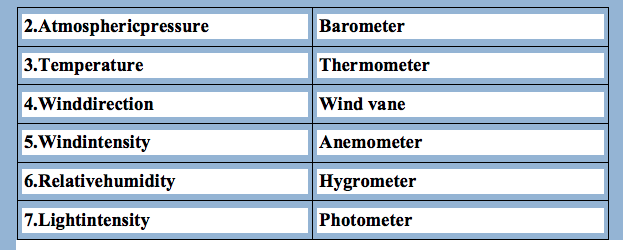
DON’T STRESS, JUST LET PROFESSIONALS DO THE STRESS, CLICK HERE TO BUY THE COMPLETE LESSON NOTE (WEEK 1-12 WITH PICTURES AND REFERENCES) FOR JUST 800 NAIRA OR HIT THE WHATSAPP BUTTON BELOW
